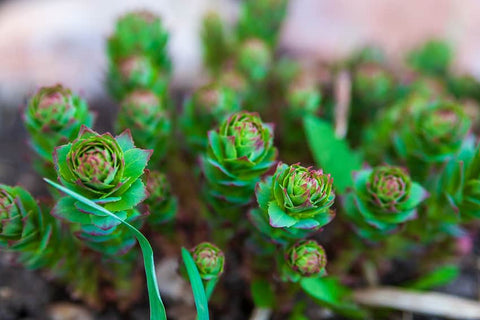Rhodiola can stay in your system for at least 4-6 hours upon consumption. The effects of rhodiola can be felt after approximately 30 minutes after taking it due to its high bioavailability, meaning it absorbs into your body quickly.
Read more about “How Long Does It Take Rhodiola Rosea to Work?” in our linked guide!
Many nootropic herbs such as rhodiola are quick-absorbing and bioavailable, which is often why you find them being key ingredients in nootropic stacks and formulas, where the cognitive-enhancing effects are highly sought-after in the short-term.
We have all been there—nervously preparing for an exam or relying on our mental performance for a big work meeting. This is precisely what a nootropic can help with, which is why it’s important to know the immediate effects upon consumption.
In this article, we discuss the benefits and uses of rhodiola, as well as the dosage, side effects, and what to expect when you take it!
An Introduction to Rhodiola Rosea
Rhodiola rosea, commonly known as just rhodiola, has been used for centuries as a traditional adaptogenic herb. It is best known to strengthen physical and mental stress, thus promoting mental energy and clarity.
Rhodiola is also thought to be a powerful aid in resisting fatigue and preventing the onset of “burn out” associated with stress. This is why you often find rhodiola a key ingredient in supplement stacks and formulas, such as Mind Lab Pro.
This powerful adaptogen promotes brain support and protection, fights mental fatigue, and promotes peak mental performance and a calm state of mind.
Let’s look a bit closer at the benefits of Rhodiola!
The Benefits of Rhodiola Rosea
- Adaptogenic properties
Adaptogens are herbs that essentially help our body cope better with the physical and mental effects of stress. These herbs have been used for centuries as adaptogens and have more recently been proven effective by much research in the field.
Adaptogens are key ingredients in nootropic formulas, as combatting stress and fatigue is the first step to enhancing cognitive performance.
These herbs, specifically rhodiola, can aid our bodies in reacting to short- and long-term physical and mental stress, while also helping us recover from these situations.
Adaptogens are also thought to have immune-boosting properties, as well as effectively easing symptoms of anxiety and depression and enhance cognition.
Though, how does this all work?
Adaptogens help us cope better with stress via many means, though two of the most noted include:
Reducing cortisol levels—the stress hormone that can have negative health effects when it is uncontrolled
Helping us stay in the “resistance” phase of our stress response—this helps us to persevere through stressful situations before the “mental crash”
- Stabalizing mood
Rhodiola is also thought to help stabilize and improve mood, and support a more balanced, calm mindset. On top of easing symptoms of anxiety and depression, rhodiola is proven to be an effective herb for helping improve overall mood.
- Promoting physical and mental performance
Some studies have suggested rhodiola improves physical and cognitive performance by reducing fatigue, and enhancing alertness, concentration, and attention. This also transfers to exercise performance, hence why you may find rhodiola in many sports supplements and ergogenic aids.
Rhodiola Rosea: Dosage
The optimal dosage of rhodiola, referring to the SHR-5 extract that confers both 3% rosavins and 1% salidroside (the active compounds found in rhodiola), is in between 288-680 mg per day.
This is recommended for the anti-stress and cognitive-enhancing properties, though doses as low as 50 mg per day are often recommended for an effective prevention against fatigue.
Rhodiola is thought to have a “bell-curve” response, which essentially means that higher doses do not equal better results and are actually ineffective.
Rhodiola Rosea: How Long Does It Stay in Your System?
Rhodiola is a water-soluble herb, meaning that it has a high bioavailability and is absorbed fairly quickly. You can expect to feel the immediate effects of rhodiola, particularly as it has a slight stimulatory effect, within 30-60 minutes upon consumption.
Rhodiola can stay in your system for at least 4-6 hours after supplementation and will likely be completely excreted within 2-3 days.
Are there any side effects?
There are no known side effects of rhodiola provided you stick to the recommended dose. It’s important to note that overdosing any supplement, even if it’s an herbal supplement, can have negative side effects.
Best Way to Take Rhodiola Rosea
While rhodiola is an effective standalone supplement and has been used for centuries as a traditional adaptogenic, there may be additional benefits to taking it alongside other nootropic ingredients or other adaptogenic herbs.
Ashwagandha is one other adaptogenic herb that rhodiola would pair well with, particularly for the anti-stress properties.
However, taking rhodiola as part of a nootropic stack or formula is also thought to be an optimal method of consumption.
This is precisely what Mind Lab Pro offers, a combination of 11 cognitive-enhancing ingredients, including rhodiola rosea, which work collectively to:
- Enhance cognition
- Increase mental and physical energy
- Reduce stress and anxiety
- Improve athletic performance
- Promote overall brain health
Rhodiola Rosea: Final Take Home
Rhodiola is one of the most popular adaptogenic herbs available, and rightly so! This powerful herb can help improve cognition and reduce symptoms of stress and anxiety within a matter of weeks.
Rhodiola is a safe and well-tolerated supplement for most people. Its immediate effects can be felt within 30 minutes of consumption and the herb can be expected to stay in your system for 4-6 hours and be totally excreted within a couple of days.
The best way to take rhodiola is as part of a nootropic formula such as Mind Lab Pro!



